

The Declaration of Independence: A Transcription. The Declaration of Independence: A Transcription IN CONGRESS, July 4, 1776.
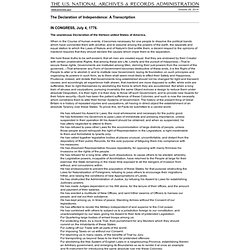
The unanimous Declaration of the thirteen united States of America, Transcript of Gettysburg Address (1863) Executive Mansion, Washington, , 186 .
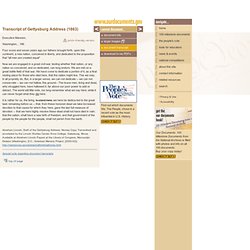
Four score and seven years ago our fathers brought forth, upon this continent, a new nation, conceived in liberty, and dedicated to the proposition that "all men are created equal" Now we are engaged in a great civil war, testing whether that nation, or any nation so conceived, and so dedicated, can long endure. We are met on a great battle field of that war. We have come to dedicate a portion of it, as a final resting place for those who died here, that the nation might live. Lincoln, “Gettysburg Address,” Speech Text. [1] Fourscore and seven years ago our fathers brought forth on this continent, a new nation, conceived in Liberty, and dedicated to the proposition that all men are created equal. [2] Now we are engaged in a great civil war, testing whether that nation, or any nation so conceived and so dedicated, can long endure.
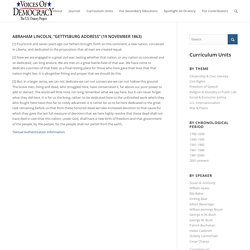
We are met on a great battle-field of that war. I Have a Dream, Address at March on Washington for Jobs and Freedom** www.archives.gov/press/exhibits/dream-speech.pdf. I’ve Been to the Mountaintop. Negro Spirituals - 1867.06. The words will be here given, as nearly as possible, in the original dialect; and if the spelling seems sometimes inconsistent, or the misspelling insufficient, it is because I could get no nearer.
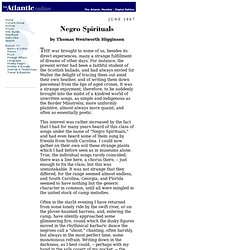
I wished to avoid what seems to me the only error of Lowell's "Biglow Papers" in respect to dialect, -- the occasional use of an extreme misspelling, which merely confuses the eye, without taking us any closer to the peculiarity of sound. The favorite song in camp was the following, -- sung with no accompaniment but the measured clapping of hands and the clatter of many feet. It was sung perhaps twice as often as any other. This was partly due to the fact that it properly consisted of a chorus alone, with which the verses of other songs might be combined at random.
I. This would be sung for half an hour at a time, perhaps, each person present being named in turn. II. Sometimes it was "tink 'em" (think them) "fare ye well. " III. IV. V. VI. VII. VIII. IX. X. XI. XII. XIII. "The Love Song of J. Alfred Prufrock" by T.S. Eliot. RefWorks Folder. Adam Gopnik New Yorker Essay on Camus. Catherine Camus on Her Father, Albert. FACING HISTORY: EBSCOhost.
14 - Essays - Ralph Waldo Emerson (1803-1882) More E-texts Essays by Ralph Waldo Emerson (1803-1882) Essays: 1 | 2 | 3 | 4 | 5 | 6 | 7 | 8 | 9 | 10 | 11 | 12 | 13 | 14 | 15 | 16 | 17 | 18 | 19 | 20 | 21 | Essay 14.
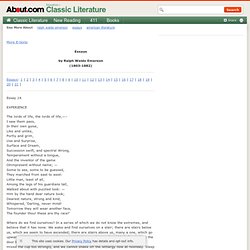
The Later Lectures of Ralph Waldo Emerson, 1843-1871. Free Will New Advent (Catholic Encyclopedia) Please help support the mission of New Advent and get the full contents of this website as an instant download.
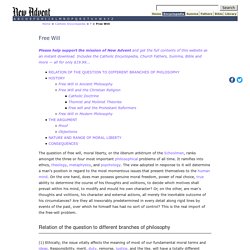
Includes the Catholic Encyclopedia, Church Fathers, Summa, Bible and more — all for only $19.99... The question of free will, moral liberty, or the liberum arbitrium of the Schoolmen, ranks amongst the three or four most important philosophical problems of all time. It ramifies into ethics, theology, metaphysics, and psychology. The view adopted in response to it will determine a man's position in regard to the most momentous issues that present themselves to the human mind. Britannica Online Encyclopedia. From the Encyclopædia Britannica.

Free will : Routledge Encyclopedia of Philosophy Online. ‘Free will’ is the conventional name of a topic that is best discussed without reference to the will.
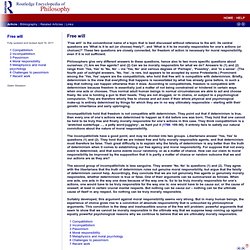
Its central questions are ‘What is it to act (or choose) freely?’ , and ‘What is it to be morally responsible for one’s actions (or choices)?’ These two questions are closely connected, for freedom of action is necessary for moral responsibility, even if it is not sufficient. Philosophers give very different answers to these questions, hence also to two more specific questions about ourselves: (1) Are we free agents? And (2) Can we be morally responsible for what we do? Incompatibilists hold that freedom is not compatible with determinism. The incompatibilists have a good point, and may be divided into two groups.
Free Will Stanford Encyclopedia of Philosophy. 1.
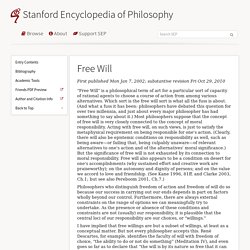
Rational Deliberation 1.1 Free Will as Choosing on the Basis of One's Desires On a minimalist account, free will is the ability to select a course of action as a means of fulfilling some desire. David Hume, for example, defines liberty as “a power of acting or of not acting, according to the determination of the will.” (1748, sect.viii, part 1). Is Free Will an Illusion? - The Chronicle Review. Free will has long been a fraught concept among philosophers and theologians.

Now neuroscience is entering the fray. For centuries, the idea that we are the authors of our own actions, beliefs, and desires has remained central to our sense of self. We choose whom to love, what thoughts to think, which impulses to resist. Or do we? Neuroscience suggests something else. What's at stake? The Chronicle Review brought together some key thinkers to discuss what science can and cannot tell us about free will, and where our conclusions might take us. Free will debate: What does free will mean and how did it evolve? Illustration by Alex Eben Meyer It has become fashionable to say that people have no free will. Many scientists cannot imagine how the idea of free will could be reconciled with the laws of physics and chemistry. Brain researchers say that the brain is just a bunch of nerve cells that fire as a direct result of chemical and electrical events, with no room for free will.
Richard Dawkins. Genesis, from The holy Bible, King James version. Bible, King James. Genesis, from The holy Bible, King James version Electronic Text Center, University of Virginia Library | The entire work (255 KB) | Table of Contents for this work | Genesis — introduction. Genesis is the first book of the Pentateuch (Genesis, Exodus, Leviticus, Numbers, Deuteronomy), the first section of the Jewish and the Christian Scriptures.
Its title in English, “Genesis,” comes from the Greek of Gn 2:4, literally, “the book of the generation (genesis) of the heavens and earth.” Its title in the Jewish Scriptures is the opening Hebrew word, Bereshit, “in the beginning.” The book has two major sections—the creation and expansion of the human race (2:4–11:9), and the story of Abraham and his descendants (11:10–50:26). Sunday Morning by Wallace Stevens. The Federalist #51. Figures of speech. Glossary of Poetic Terms. Allegory A symbolic narrative in which the surface details imply a secondary meaning. Allegory often takes the form of a story in which the characters represent moral qualities.
The most famous example in English is John Bunyan's Pilgrim's Progress, in which the name of the central character, Pilgrim, epitomizes the book's allegorical nature. Kay Boyle's story "Astronomer's Wife" and Christina Rossetti's poem "Up-Hill" both contain allegorical elements. Modern and Classical, Languages, Literatures and Cultures. A Glossary of Rhetorical Terms with Examples This glossary came to us from our late colleague Ross Scaife, who encountered it during his graduate studies at the University of Texas.
Chris Renaud gave it to him, stating that it originated with Ernest Ament of Wayne State University. Hygini Fabulae. HYGINUS, FABULAE 200 - 277.